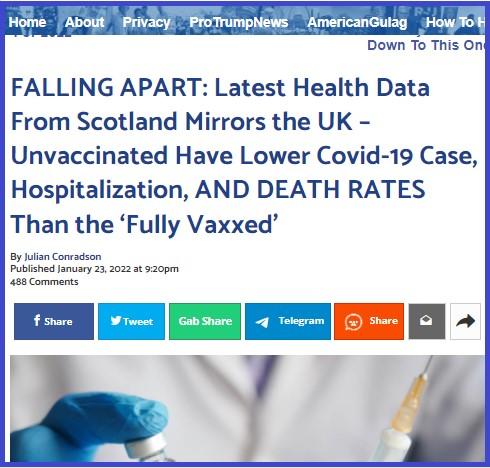
Does a comparison of January 2022 case rates for the unvaccinated and the vaccinated in Scotland prove that refusing vaccination improves Scots' odds of avoiding infection, hospitalization and death from COVID-19? No, that's not true: A gross comparison of the two groups does not account for important differences between those two groups other than their vaccination status. For instance, the vaccinated are more likely to be elderly and to have other health problems that make them vulnerable to infection. Public health officials say the vaccinated are more likely to get tested and report an infection, which skews their case rate upward. The unvaccinated are more likely to have been previously infected, giving them resistance to the dominant-in-January omicron variant.
The claim has circulated on social media, often citing this January 23, 2022, Gateway Pundit article (archived here) published under the title "FALLING APART: Latest Health Data From Scotland Mirrors the UK - Unvaccinated Have Lower Covid-19 Case, Hospitalization, AND DEATH RATES Than the 'Fully Vaxxed'". It opened:
The latest public health data published by the Scottish Government reveals that the COVID-19 "age-standardized case rate" is at its highest among the double-jabbed 'fully vaccinated' - and it isn't particularly close.
The update also showed the sharp negative efficiency was maintained throughout double vaccinated rates for hospitalizations and deaths over the past four weeks. And just like in the UK, the group who has fared the best when it comes to avoiding the Wu-flu over the past four weeks has been the unvaccinated.
This is how the story appeared on the date of writing:
(Source: thegatewaypundit.com screenshot taken Wed Jan 26 at 23:45:22 2022 UTC)
There is a consensus among health statisticians working independently that vaccination reduces your odds of infection, hospitalization and death. Because no vaccine is 100% effective and because the vaccinated tend to be older than the unvaccinated, amateur statisticians often reach a false conclusion about correlations between case rates and vaccination.
On its website, the UK Health Security Agency (UKHSA) acknowledges the risk of fully sharing health statistics is that some in the public will misinterpret records of testing, hospitalization and death. But Mary Ramsay, the epidemiologist writing for the agency, said full transparency is better than shielding data from the public, so long as methods are explained.
For starters, she wrote, case rate data are far less reliable than hospitalization and death data, when it comes to tracking the effectiveness of vaccines. In a November 2021 blog post about the two kinds of data, Ramsay said the formulas and methods are well-established and show that "the rates of hospitalisation and deaths are substantially lower in fully vaccinated people, across all age groups. It is clear therefore that COVID-19 vaccines provide a high level of protection against severe outcomes."
The data from Scotland are published with an explicit warning about making false claims based on simply comparing case rates of the vaccinated and unvaccinated. Ramsay wrote:
If we look at the numbers of cases in vaccinated compared to unvaccinated people, the rate of cases in the vaccinated people appears higher for many age groups. This is because there are key differences in the characteristics and behaviour of individuals who are vaccinated compared to those who are unvaccinated. The rates therefore reflect this population's behaviour and exposure to COVID-19, not how well the vaccines work.
Ramsay listed the overlapping factors a simple comparison doesn't account for:
People who are fully vaccinated may be more health conscious and therefore more likely to get tested for COVID-19 and so more likely to be identified as a case (based on the data provided by the NHS Test and Trace).
Many of those who were at the head of the queue for vaccination are those at higher risk from COVID-19 due to their age, their occupation, their family circumstances or because of underlying health issues.
People who are fully vaccinated and people who are unvaccinated may behave differently, particularly with regard to social interactions and therefore may have differing levels of exposure to COVID-19.
People who have never been vaccinated are more likely to have caught COVID-19 in the weeks or months before the period of the cases covered in the report. This gives them some natural immunity to the virus for a few months which may have contributed to a lower case rate in the past few weeks.
In contrast to the Gateway Pundit's raw side-by-side analysis, the UKHSA tests the effectiveness of vaccines by using a number of analytical approaches accepted by health statisticians. UKHSA compares the vaccination status of people who test positive for COVID versus those who test negative, a method extolled by the editors of the New England Journal of Medicine in an October, 2021 editorial. It's a method that controls for differing propensities to have a test and excludes those known to have already been infected, whose immunity is therefore not just vaccine-based. Ramsay wrote that UKHSA also controls for important factors including geography, time period, ethnicity, clinical risk group, living in a care home and being a health or social care worker.
"We believe that transparency -- coupled with explanation -- remains the best way to deal with misinformation," Ramsay wrote in defending the decision to share data that can be misinterpreted by those who don't understand statistical analysis and the need to control for consequential factors.
Lead Stories has tested claims of several posts in which amateurs have used simplistic analysis to argue that public health data are showing vaccines don't work, finding similar misleading conclusions. In one case, a blogger calculated 89% of new UK COVID cases were among the fully vaccinated, failing to point out that that figure was only for those older than 60, who are already at higher risk for infection. In another instance, an anti-vaccine newsletter left out the very high vaccination rate in England when using a statistic showing four of every five COVID victims in England had been vaccinated.


















